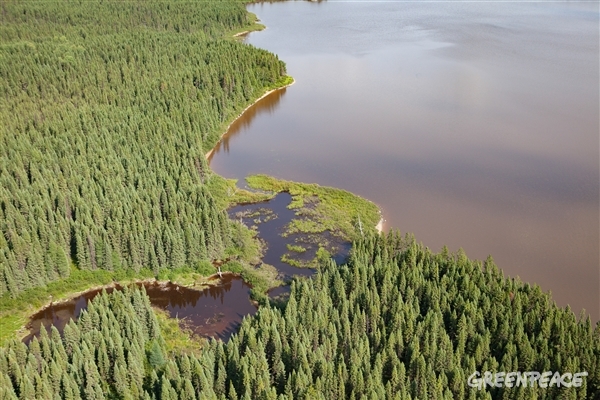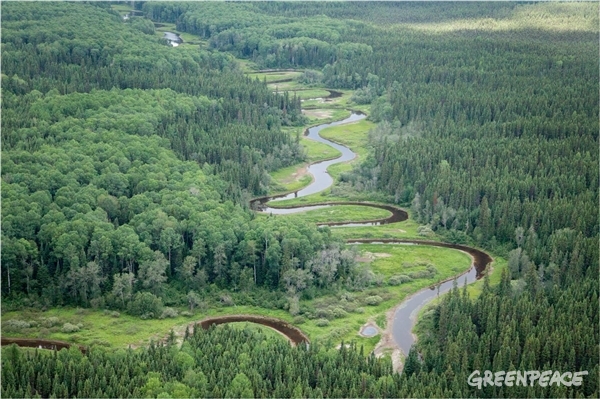
The term Intact Forest Landscape (IFL) is well recognized in scientific literature and certification standards, and within the supply chain and in the policies of major forest product companies. IFLs are defined as unbroken expanses of natural forest ecosystems showing no signs of significant human activity, and large enough (minimum 500 km2 or 123 000 acres) that all native biodiversity, including viable populations of wide-ranging species, can be maintained. In addition to playing a critical role in maintaining biodiversity, intact forests also regulate air and water cycles and store carbon to slow and prevent climate change.
Canada leads the world in Intact Forest loss
The primary drivers of IFL loss are clearing and logging, human-ignited forest fires and fragmentation by disturbance and infrastructure. New data published in 2014 revealed that Canada leads the world in loss of intact forests, with 21% of intact forest loss worldwide between 2000 and 2013 occurring in Canada.
Motion 65 is a resolution adopted by the General Assembly of the Forest Stewardship Council (FSC) in September 2014. The FSC is the world’s top voluntary certification system dedicated to the promotion of responsible forest management. The motion clarifies and reconfirms the FSC’s existing commitment to the protection of Intact Forest Landscapes (IFLs) as a category of High Conservation Value Forests. Motion 65 was overwhelmingly approved by FSC members representing economic, social and indigenous, and environmental interests. The full text of the motion can be read here. In sum, Motion 65 directs national FSC organizations and auditors to develop, modify, or strengthen auditable standards to ensure FSC certification is safeguarding Intact Forest Landscapes in areas that are FSC certified. Motion 65 also affirms that Intact Forest Landscapes are not empty of people – in fact in many regions, Indigenous Peoples have acted as stewards and users of their lands and these IFLs for thousands of years.

Intact Forests are already recognized and valued in the FSC system
The FSC is grounded in ten principles of Forest Stewardship. Principle 9, which has existed since the system was first developed, requires certified companies to “maintain or enhance” High Conservation Values. Intact Forest Landscapes are a High Conservation Value. Recent mapping studies that documented the dramatic loss of Intact Forest Landscapes globally provided an incentive to FSC members to create more explicit guidance for forest management in these areas. Motion 65 represents an opportunity ensure FSC certification is not contributing to the loss of the world’s remaining Intact Forests, provides more certainty to businesses that operate in IFL regions or potentially source from IFL regions, and enhances the FSC’s credibility, reputation and relevance. If properly implemented, it will reduce pressure on threatened wildlife species like the Woodland Caribou which require vast areas of undisturbed habitat to survive.
Unfortunately some parties are purposely spreading misinformation about Motion 65, fearmongering that it will shut down forestry across Canada. Below are some myths about Motion 65 cited by its critics and our interpretation of the true intentions of Motion 65.
Myth: Motion 65 is a unilateral attempt by the environmental chamber of FSC to shut down logging in many forest regions. Motion 65 is a “Greenpeace proposal”.
Fact: While Motion 65 was originally put forward by Greenpeace, seconded by Brazilian forest products company Amata S.A and Danish conservation organization Verdens Skove at the 2014 General Assembly of FSC, it received overwhelming support by FSC members from all three FSC chambers: economic, social, and environmental. The FSC is a democratic institution and chambers are given equal weight. Motions are put forward by individual members, debated, modified, sometimes substantially, and then brought to a vote. Motions that do not receive majority support from all three chambers do not get implemented.
“It represents the spirit of FSC, which is to save the forests.” – Economic South member
Members who voted at the 2014 General Assembly recognized the importance of preserving the world’s last remaining original forests and supported FSC doing a better job at achieving this. 99% of the Social and Environmental chambers supported the Motion and 73% of the Economic chamber which includes logging companies big and small, printers and paper makers, and big branded consumers of paper and lumber, supported it.
Myth: Motion 65 will introduce major new protection requirements for the Boreal Forest.
Fact: Intact forest landscapes overlap very highly with woodland caribou habitat (~95% in Ontario and ~85% in Quebec), which is already prioritised for much-needed conservation measures.
“We need some certainty that this motion can bring.” – Environmental North member
Myth: Motion 65 applies to any company operating in the Boreal Forest.
Fact: Motion 65, of course, only applies to companies who have, or are seeking FSC certification, which is a voluntary standard. If a company is not interested in FSC certification, it is not bound by this voluntary standard.
Myth: Motion 65 will apply to any forest area in the Boreal Forest.
Fact: Motion 65 as it seeks to conserve Intact Forest Landscapes will only pertain to forest management tenures where IFLs still exist. The vast majority of IFLs have been lost in the managed forest in Canada due to past logging, roads and other types of industrial development. Less than 15% of the Boreal Forest currently open to logging contains Intact Forest Landscapes, meaning Motion 65 will not apply to 85% of the managed forest landbase.
Myth: Motion 65 will make it impossible for companies to do business in the northern Boreal Forest.
Fact: The motion calls for a careful approach to planning in Intact Forest Landscape regions so that important ecological and cultural values that come with these increasingly rare forest areas in the managed forest, are protected. There are examples of companies already doing this in the Boreal Forest, which shows that IFL conservation is possible. Furthermore the motion does not ‘shut down’ logging, it requires maintenance of the integrity of these forests where IFLs are present.
Myth: Motion 65 will harm communities by limiting economic opportunity.
Fact: Explicit provisions are made within the Motion to allow for economic opportunities, including low-impact logging, non-timber forest products, and ecosystem services. In fact the motion requires that when activities are conducted in IFLs, they must directly benefit communities. Protecting IFLs also encourages companies to better manage secondary forests which have already been logged, and which are adjacent to existing mills. Better regeneration of secondary forests can mean long-term and more stable jobs, and can offset the boom and bust cycle that currently exists in the forest sector.
“It is important for the indigenous peoples and those people who depend on forests, as well as the fight of the peoples to maintain/preserve their territory. It would help to safe the lives of indigenous that live voluntary apart. It would help to avoid illegal logging. It would help to defend the rights of the indigenous peoples.” – Social South member
Myth: Motion 65 puts too much strain on the FSC system by making standards overly onerous.
Fact: Motion 65 is no more onerous or important than any other of FSC’s requirements. Not having clarity on what is and is not acceptable for FSC certification in IFL areas is risky. Without clarity on how to address conservation of IFLs properly, the process for FSC certification can become very complicated as certified companies are unable to plan coherently. Without a better understanding of what activities will or will not violate FSC Principle 9. Motion 65 distinguishes FSC from the weaker forest certification schemes such as PEFC and SFI, but making it the only system to recognise the importance of protecting IFLs. Its commitment to continuous improvement and a high ecological bar is the reason why FSC is the only system recognized by leading conservation organizations and social movements.
Myth: Motion 65 undermines the rights of Indigenous Peoples.
Fact: Motion 65 clearly states that any plans within IFLs, whether economic or conservation focused, must have the Free, Prior and Informed Consent (FPIC) of affected Indigenous communities. FPIC is a basic foundation of FSC and it applies to all activities, including within IFLs. This acknowledges Indigenous Peoples’ right to lead decision making on their traditional territories. Around the world, Indigenous communities have struggled to protect IFLs within their homelands. Motion 65 recognizes this, and provides an additional tool available to them. In Canada, the aboriginal chamber has proposed the notion of Indigenous Cultural Landscapes, which recognizes the important role of Indigenous Peoples in shaping and maintaining IFLs. Greenpeace supports this concept.
“This motion is extremely important for indigenous people. It will help us to safeguard the struggle of indigenous people to preserve their territories.” – Social South member
Motion 65 allows FSC to remain relevant in a world where our few remaining original forests are rapidly disappearing. It provides a framework for inclusive decision-making, based on science, the needs of forest dependent communities, and the rights of Indigenous Peoples. It is an opportunity, not a liability.

